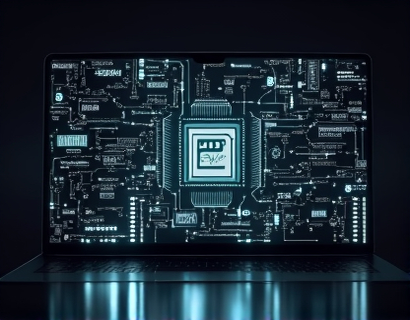Secure Pseudonym Generation for Blockchain and AI: A Comprehensive Guide to Privacy Compliance and Secure Digital Interactions
In the rapidly evolving landscape of technology, the need for privacy and security has become paramount, especially for tech users who are privacy-conscious and active in blockchain and AI environments. The intersection of these technologies presents unique challenges and opportunities, particularly in the realm of identity management and data protection. This article delves into the innovative software solutions designed to create and manage secure pseudonyms, ensuring compliance with regulatory standards and facilitating anonymous digital interactions.
Understanding Pseudonyms in Digital Environments
Before exploring the software solutions, it's essential to understand what pseudonyms are and their role in digital interactions. A pseudonym is an alias or a name that replaces a person's real identity. In the context of blockchain and AI, pseudonyms serve as a layer of anonymity, allowing users to engage in transactions and interactions without revealing their true identities. This is crucial for maintaining privacy and reducing the risk of identity theft or unauthorized data access.
The Importance of Privacy in Blockchain and AI
Blockchain technology, known for its transparency, also poses significant privacy challenges. While the decentralized and immutable nature of blockchain ensures data integrity, it can also make user activities highly traceable. Similarly, AI systems often require vast amounts of personal data to function effectively, raising concerns about data privacy and compliance with regulations such as GDPR and CCPA. The integration of secure pseudonym generation is a critical step in addressing these concerns, providing a balance between transparency and privacy.
Regulatory Compliance and Pseudonyms
Regulatory frameworks like the General Data Protection Regulation (GDPR) in the European Union and the California Consumer Privacy Act (CCPA) in the United States impose strict requirements on data handling and user privacy. These regulations mandate that personal data be processed lawfully, transparently, and securely. Pseudonyms play a vital role in compliance by allowing organizations to separate user identities from their transactions and data, thereby reducing the risk of non-compliance and potential fines.
Challenges in Pseudonym Generation
Generating secure pseudonyms is not a trivial task. The pseudonyms must be unique, unpredictable, and resistant to reverse engineering. They should also be easily manageable and reversible only by the user, ensuring that the underlying identity remains protected. Additionally, the pseudonym generation process must be scalable to handle a large number of users and transactions without compromising performance or security.
Innovative Software Solutions for Pseudonym Generation
To address these challenges, innovative software solutions have emerged, focusing on the creation and management of secure pseudonyms. These platforms leverage advanced cryptographic techniques and algorithms to generate robust pseudonyms that meet the stringent requirements of privacy and security.
Key Features of Pseudonym Generation Software
- Cryptographic Security: Utilizing strong cryptographic algorithms to ensure that pseudonyms are difficult to trace back to the user's real identity.
- Uniqueness and Randomness: Generating unique and random pseudonyms to prevent collisions and ensure anonymity.
- User Control: Providing users with full control over their pseudonyms, including the ability to generate, manage, and revoke them as needed.
- Compliance Management: Integrating features that help organizations comply with various privacy regulations, such as logging and reporting mechanisms.
- Seamless Integration: Designing the software to integrate smoothly with existing blockchain and AI systems, ensuring minimal disruption and enhanced security.
How Pseudonym Generation Works
The process of generating a secure pseudonym involves several steps, each designed to enhance privacy and security:
- Key Generation: A cryptographic key is generated using a secure random number generator. This key serves as the foundation for the pseudonym.
- Pseudonym Creation: The cryptographic key is processed through a hash function or other cryptographic algorithm to produce a pseudonym. This pseudonym is then used for all subsequent interactions.
- Mapping and Management: The software maintains a secure mapping between the pseudonym and the user's real identity, ensuring that only the user can link their pseudonym to their true identity if needed.
- Revocation and Rotation: Users can revoke or rotate their pseudonyms as required, adding an extra layer of security and control.
Benefits of Using Pseudonym Generation Software
The adoption of pseudonym generation software offers numerous benefits for both individuals and organizations:
- Enhanced Privacy: Users can engage in blockchain and AI activities without exposing their real identities, reducing the risk of privacy breaches.
- Regulatory Compliance: Organizations can ensure compliance with privacy laws by using pseudonyms to separate user data from identifiable information.
- Improved Security: The use of strong cryptographic techniques makes it difficult for malicious actors to trace transactions or interactions back to the user.
- User Empowerment: Users gain control over their digital identities, allowing them to manage their privacy preferences effectively.
- Scalability: The software is designed to handle a large number of users and transactions, making it suitable for widespread adoption.
Real-World Applications of Pseudonym Generation
The applications of pseudonym generation software are diverse and impactful across various sectors:
- Decentralized Finance (DeFi): Users can participate in financial transactions and smart contracts without revealing their real identities, enhancing security and privacy.
- Supply Chain Management: Companies can track products and transactions anonymously, ensuring compliance with regulations while protecting sensitive information.
- Healthcare Data Sharing: Patients can share their health data for research and treatment without exposing their personal details, facilitating medical advancements while maintaining privacy.
- Social Media and Online Platforms: Users can interact on social networks and other platforms without fear of surveillance or data misuse.
Future Trends in Pseudonym Generation
The field of pseudonym generation is continually evolving, driven by advancements in cryptography, blockchain technology, and AI. Future trends include:
- Zero-Knowledge Proofs: Integration of zero-knowledge proofs to allow verification of transactions or identities without revealing any underlying information.
- Self-Sovereign Identity: Development of self-sovereign identity systems where users have full control over their digital identities and pseudonyms.
- AI-Enhanced Pseudonyms: Utilizing AI to generate and manage pseudonyms that adapt to user behavior and risk profiles, enhancing both security and user experience.
- Interoperability: Ensuring that pseudonym generation solutions work seamlessly across different blockchain and AI platforms, fostering a more connected and secure digital ecosystem.
Conclusion
The integration of secure pseudonym generation software in blockchain and AI environments is a critical step towards achieving privacy compliance and secure digital interactions. By providing robust, user-friendly solutions, these platforms empower tech users to maintain their privacy while fully leveraging the benefits of decentralized and intelligent systems. As the digital landscape continues to evolve, the importance of such solutions will only grow, making them an essential tool for privacy-conscious individuals and organizations alike.










































